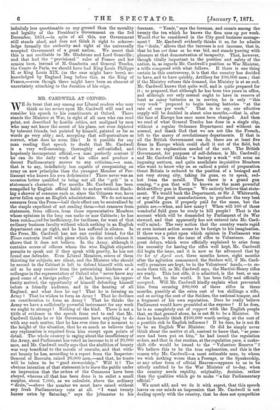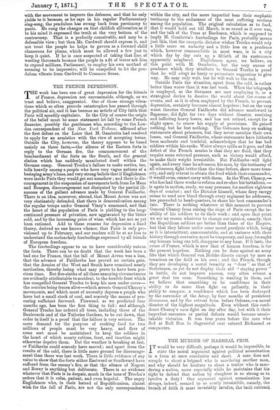MR. CARDWELL AT OXFORD.
WE do trust that any among our Liberal readers who may think us too severe upon Mr. Cardwell will read and consider his speech to his constituents at Oxford. There stands the Minister at War, in sight of all men who can read print, not described by hostile critics, not maligned by men who may not know the secret of his plans, not even depicted by tolerant friends, but painted by himself, painted as far as words go very ably ; and, accepting that self-portraiture as correct, what does he seem like ? Is it possible for any man reading that speech to doubt that Mr. Cardwell is a very well-meaning, thoroughly self-satisfied, and hopelessly incompetent official,—a man perfectly content if he can do the daily work of his office and produce a decent Parliamentary answer to any criticism,—a man, that is to say, indefinitely less capable of reorganizing an army on new principles than the youngest Member of Par- liament who knows his own deficiencies ? There never was an occasion better qualified to bring out all the "grit " in a statesman's character. For months Mr. Cardwell has been compelled by English official habit to endure without flinch- ing a shower of censures such as, since the Crimean war, have never fallen upon an English administrator. We do not mean censures from the Press—half their effect can be neutralized by the simple expedieat of not reading them—but censures from statesmen, from officers, from those representative Members whose opinions in the long run make or mar Cabinets ; he has been cOndwa.-1ed for inefficiency, for tardiness, for want of that ordinary business faculty without which nothing in an English department can go right, and he has suffered in silence. In the Press, Mr. Cardwell has not one cordial friend, for the Times contents itself with pleas which in the next column it shows that it does not believe. In the Army, although it contains scores of officers whom the wise English etiquette permits to speak out if they speak with gravity, he has not found one defender. Even Liberal Members, scores of them thirsting for subjects, are silent, and the Minister who should be second in the Cabinet is left to defend himself with such aid as he may receive from the patronizing kindness of a colleague in the representation of Oxford who " never knew any good come of a foreign policy." At last, however, his oppor- tunity arrived, the opportunity of himself defending himself before a friendly audience, and in the hearing of all England, and what does he say ? That he is forming an Army ? That he wishes to form an Army ? That he declines on consideration to form an Army ? That he thinks the Army we have a sufficiently powerful instrument for any work we ought to attempt ? Nothing of the kind. There is not a tittle of evidence in the speech from end to end that Mr. Cardwell thinks he or his Government have anything to do with any such matter, that he has ever risen for a moment to the height of the situation, that he so much as believes that any explanation is required from him except upon points of detail. The whole country is raging about the insufficiency of the Army, and Parliament has voted an increase to it of 20,000 men, and Mr. Cardwell coolly says that the abolition of bounty was very beneficial to the morals of recruits, and that with- out bounty he has, according to a report from the Inspector- General of Recruits, raised 20,000 men,—and that, he trusts will be taken to be " good stewardship." Will it ? The obvious intention of that statement is to leave the public under an impression that the orders of the Commons have been obeyed, whereas all that has been done is to enlist a small surplus, about 7,000, as we calculate, above the ordinary " drain,"—above the number we must have raised without any fresh Parliamentary vote at all. " I want twenty horses extra by Saturday," says the jobmaster to his foreman. " Yessir," says the foreman, and counts among the- twenty the ten which he knows the firm uses up per week. Would that be considered in the City good business manage- ment ? Mr. Cardwell evidently thinks it so, for he admits the " drain," allows that the increase is not increase, that is, that he has not done as he was bid, and stands 'tarring with pleasure at that demonstration of incapacity. That, however, though vitally important to the position and safety of the nation, is, as regards Mr. Cardwell's position as War Minister, a trifle compared with what follows. If there is one thing certain in this controversy, it is that the country has decided- to have, and to have quickly, Artillery for 100,000 men ; that if the Ministry refuses this demand, the Ministry is at an end. Mr. Cardwell knows that quite well, and is quite prepared for it ; so prepared, that although he has been two years-in office, and although our only arsenal ought .to have in reserve at least as many batteries as in service, he is only " this very week " prepared to begin issuing batteries "at the rate of one per week." That is to say, our effective- supply will be doubled in about nine months,—that is, after the face of Europe has once more been changed. And then we read of what General Trochu has done in a single city, without a regular Ordnance Department and without an arsenal, and thank God that we are not like the French, left to the mercy of revolutionary departments. If that is all the British Government can do, there are at least five- firms in Europe which could shell it out of the field, but there is no explanation needed of the sort. The British Government, for purposes of self-defence, is Mr. Cardwell ; and Mr. Cardwell thinks " a battery a week " will seem an imposing outturn, and quite annihilate inquisitive Members who want to know why on so radical a point of preparation Great Britain is reduced to the position of a besieged and not very strong city, taking its guns, so to speak, red- hot from the mould. Then there is a grand gun coming, " a gun that will be known as the most powerful field-artillery gun in Europe." We entirely believe that state- ment. We would back the Department, or Sir J. Whitworth, or any of the great manufacturers, to produce the very best of possible guns, if properly paid for the same, but the points are,—when, and how many ? When will 100 of these wonderful field guns be ready to kill people ? That is the account which will be demanded by Parliament of its War steward, and that apparently has not entered into Mr. Card- well's mind.. The very notion that the country wants rapid or even instant action seems to be foreign to his imagination. If there was a point upon which opinion in Parliament was unanimous, it was the issue of rifles to Volunteers. After- great delays, which were officially explained to arise from the necessity for having the rifles well kept, Mr. Cardwell did begin the issue, and it is now so far advanced that by the 1st of April next, three months hence, eight months- after the agitation commenced, the Sniders will, if Mr. Card- well's promises are kept, be in the Volunteers' hands,—to re- main there till, as Mr. Cardwell says, the Martini-Henry rifles. are ready. This last rifle, it is admitted, is the best, or one of the best, in the world. It has been fully and officially- accepted. Will Mr. Cardwell kindly explain what prevented him from securing 200,000 of these rifles in three- months, possibly at the extra cost of ten shillings a rifle, and so saving the cost of the Sniders, the national temper, and a fragment of his own reputation. Does he really believe Parliament would have grumbled at the expense If he does, he is so completely out of rapport with the English people that, on that ground alone, he is not fit to be a Minister. Or does he honestly think £100,000 worth saving, at the cost of a possible risk to English influence ? If he does, he is not fit to be an English War Minister. Or did he simply never think about the matter at all, content to know that, "as pres- sure had been put on him," he had issued the regulation orders, and that in due routine, at the regulation pace, a make- shift rifle would be issued to the " Volunteer Reserve " ? We believe this to be the true explanation, and this is the reason why Mr. Cardwell—a most estimable man, to whom we wish nothing worse than a Peerage, or the Speakership, or any other form of official Heaven—appears to us to be utterly unfitted to be the War Minister of to-day, when the country needs rapidity, originality, decision, rather than the qualities which go to make " a fair Parliamentary official."
We must add, and we do it with regret, that this speech leaves on our minds an impression that Mr. Cardwell is not dealing openly with the country, that he does not sympathize with the movement to improve the defences, and that he only yields to it because, as he says in his regular Parliamentary sing-song, the pendulum has swung back from parsimony to panic. He rung the changes on that childish alliteration as if to his mind it expressed the troth at the very bottom of the controversy. That is a perfectly conceivable, and may be a defensible view ; but then Mr. Cardwell should express it, and not treat the people he helps to govern as a froward child clamorous for plums, which mast be allowed a few just to keep it quiet. If he is once suspected of taking that line, of wasting thousands because the people in a fit of terror ask him to expend millions, Parliament, to employ his own method of seeming to be impressive, will be compelled to let the pen- dulum vibrate from Cardwell to Common Sense.































 Previous page
Previous page